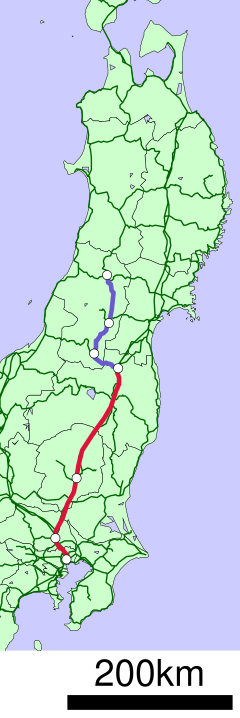Yamagata Shinkansen
| Yamagata Shinkansen | |||
|---|---|---|---|
 An E3-1000 series train on the Yamagata Shinkansen in March 2015 | |||
| Overview | |||
| Native name | 山形新幹線 | ||
| Owner | JR East | ||
| Locale | Fukushima and Yamagata Prefectures | ||
| Termini | |||
| Stations | 11 | ||
| Service | |||
| Type | Mini-shinkansen | ||
| Rolling stock | E3-1000 series/E3-2000 series | ||
| History | |||
| Opened | 1 July 1992 | ||
| Technical | |||
| Line length | 148.6 km | ||
| Track gauge | 1,435 mm (4 ft 8+1⁄2 in) | ||
| Electrification | 20 kV AC, 50 Hz, overhead catenary | ||
| Operating speed | 130 km/h (80 mph) | ||
| |||
The Yamagata Shinkansen (山形新幹線) is a Mini-shinkansen route in Japan, operated by East Japan Railway Company (JR East). It provides service between Tokyo and Shinjō in Yamagata Prefecture over the tracks of the Tohoku Shinkansen and the Ōu Main Line.
The term Yamagata Shinkansen refers to the segment that connects Fukushima and Shinjō. Because the shinkansen trains share tracks with regular service trains, it is often referred to as a "mini-shinkansen".
Operations

Trains consist of 7-car E3 series trainsets operating as Tsubasa services. Between Tokyo and Fukushima, the trains run coupled to Yamabiko trains on the Tōhoku Shinkansen. Between Fukushima and Shinjō, the trains run on their own at a maximum speed of 130 km/h (80 mph) and share the line with regular Ōu Main Line trains.[1]
As of July 2012, about 62 million passengers had ridden the line since it opened in July 1992.[2] The fastest trains connected Tokyo and Yamagata stations in two hours and 29 minutes.[2]
Station list
- All stations listed below are located on the Ōu Main Line.
- Beyond Fukushima, trains bound for Tokyo run with Tohoku Shinkansen trains.
| Station | Japanese | Distance (km) | Transfers | Location | ||
|---|---|---|---|---|---|---|
| From Tokyo | From Fukushima | |||||
| Fukushima | 福島 | 272.8 | 0.0 | Tōhoku Shinkansen (for Morioka), Tōhoku Main Line AbukumaExpress: Abukuma Express Line Fukushima Transportation: Iizaka Line |
Fukushima | Fukushima |
| Yonezawa | 米沢 | 312.9 | 40.1 | Yonesaka Line | Yonezawa | Yamagata |
| Takahata | 高畠 | 322.7 | 49.9 | Takahata, Higashiokitama District | ||
| Akayu | 赤湯 | 328.9 | 56.1 | Flower Nagai Line | Nanyō | |
| Kaminoyama-Onsen | かみのやま温泉 | 347.8 | 75.0 | Kaminoyama | ||
| Yamagata | 山形 | 359.9 | 87.1 | Yamagata | ||
| Tendō | 天童 | 373.2 | 100.4 | Tendō | ||
| Sakurambo-Higashine | さくらんぼ東根 | 380.9 | 108.1 | Higashine | ||
| Murayama | 村山 | 386.3 | 113.5 | Murayama | ||
| Ōishida | 大石田 | 399.7 | 126.9 | Ōishida, Kitamurayama District | ||
| Shinjō | 新庄 | 421.4 | 148.6 | Ōu Main Line, Rikuu East Line, Rikuu West Line | Shinjō | |
Rolling stock

- E3-1000 series 7-car sets, since 4 December 1999 (to be replaced by E8 series after 2024.
- E3-2000 series 7 car sets, since 20 December 2008
Past rolling stock

- 400 series 7-car sets (originally 6-car sets) withdrawn by April 2010
History
- July 1, 1992: Tsubasa services start from Tokyo to Yamagata with six-car 400 Series Shinkansen attached to a 200 Series Shinkansen on Tōhoku Shinkansen tracks between Tokyo and Fukushima.
- December 1, 1995: Trains are extended to seven cars.
- December 4, 1999: Line is extended to Shinjō.
- September 21, 2001: Double-decker E4 Series Shinkansen replace the 200 series trains on the Tōhoku Shinkansen.
- March 18, 2007: All cars are made non-smoking.
- December 20, 2008: E3-2000 series trains enter service
- April 18, 2010: 400 series trains cease operations.
- March 11, 2011: All services are suspended due to the Tōhoku earthquake and tsunami.
- March 31, 2011: Partial services resume between Fukushima and Shinjō.
- April 12, 2011: Through-service resumed between Tokyo and Shinjō but at half of previous capacity.[3]
References
- ^ "300km/hのトップランナー" [300 km/h Top Runners]. Japan Railfan Magazine. Vol. 52, no. 612. Japan: Koyusha Co., Ltd. April 2012. p. 14.
- ^ a b "Yamagata Shinkansen Line turns 20". The Japan Times. Japan: The Japan Times Ltd. 3 July 2012. p. 2. Archived from the original on 25 July 2012. Retrieved 30 December 2013.
- ^ NHK, "Yamagata Shinkansen fully resumes operations", 12 April 2011.
External links
- Stations of Yamagata Shinkansen (JR East) (in Japanese)





